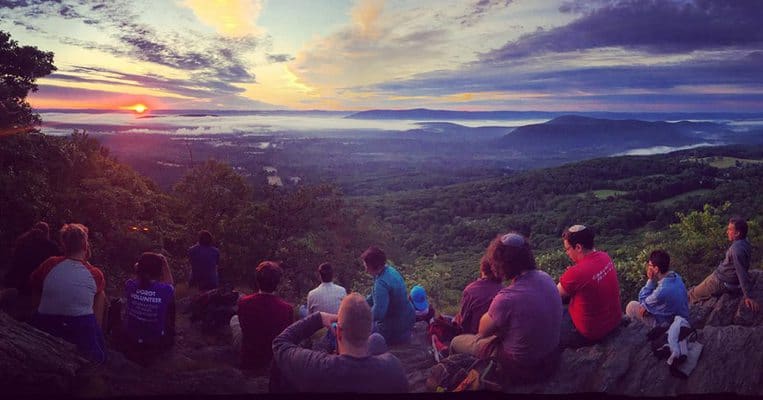by Eliezer Weinbach, Isabella Freedman Jewish Retreat Center, Hazon
Parshat Maasei
וַיִּכְתֹּב מֹשֶׁה אֶת-מוֹצָאֵיהֶם, לְמַסְעֵיהֶם–עַל-פִּי יְהוָה; וְאֵלֶּה מַסְעֵיהֶם, לְמוֹצָאֵיהֶםAnd Moses wrote each stage of their journeys as God commanded; and these are the stages of their journeys.
Numbers 33:2
Earlier this year, Isabella Freedman hosted a Moishe House retreat called “Wandering Jews.”
Led by New York Times contributor Eli Reiter, twelve people in their twenties and thirties got together to discuss their experiences and wisdom regarding travel as a Jewish person. They discussed things like kashruth and shabbat observance while abroad.
The question is: Why bother?
When the Torah lists all the stages of the journey through the desert, as per the text from Numbers above, it really does discuss each part. All forty-two stages, in fact!
The question is: Why bother?
God commands that when the Jews do finally enter the land, they are to travel three times a year to Jerusalem.
Wasn’t the journey to the land long enough?! Why bother?!
Travel is hard. Sitting at home is easy.
Hiking is hard. Watching Netflix is easy.
Adventures change you. Inaction keeps you the same.
Wandering is change. On a very basic level, you are moving from one place to another. But it’s so much more than that.
I could quote Emerson on “roads less traveled” or Kerouac on basically anything, or any of the myriad formulations regarding “journey vs. destination,” but we all know it in our bones. Wherever we are isn’t quite enough. Our spirits are thirsty for “new” and “different” and “more.”
It’s not just about knowledge. BBC’s Planet Earth is great. It’s breathtaking and educational, but it doesn’t smell like the woods and doesn’t feel like the soil. I remember sitting at my desk at home watching Planet Earth, and David Attenborough was narrating the journey of some bird that flies miles and miles to get water every day. Instead of absorbing any facts, like the name of the bird, or where on Earth this desert was, I got fixated on a feeling: my body had a sudden urge to go running.
This urgency hits every now and then. I think the term is “wanderlust.” A small form of this might be what my grandmother calls “shplikes.” It’s the Traveler in each of us, the primal instinct to find something somewhere else.
I heard recently that the reason people like shiny things is evolutionary – our evolutionary ancestors that were attracted to shiny things found water more often. Like that bird in Planet Earth, journeys to water are woven into our DNA.
Modern technology has hijacked that instinct. The shiniest thing in our everyday lives is the vibrant display of our LCD screens. Our computers convince us that reading articles and engaging on Facebook has given us real experience and wisdom, but it hasn’t. We’ve merely fallen into the trap of complacency – we let others do our research, we let others do our shopping, we let others do our exploring. The story of the Spies (related earlier in Numbers 13) teaches this very lesson – don’t send others to have your experiences for you.
The Torah teaches us that every single journey is of the utmost importance by listing every one of the forty-two moves the Jews made in the desert. It is important to note the specific language of the verse: Moses wrote the “מוֹצָאֵיהֶם” (motzaeihem) of the Jews. The root of that word is י – צ – א, “go out.”
The destinations were listed, but the verse seems to be saying that the key was the journey – the going. There were stops, but that’s not actually what God wanted recorded.
Journey before destination. It’s a mindset. When we turn on our phones see a Buzzfeed article about a beautiful destination, which is destination-centric, we say something like “I wish I was there.” When we hike up a mountain, a journey-centric experience, we say “I’m so happy I’m here.”
All the Wandering Jews feel this.
All the people who come to Isabella Freedman feel this.
All of humanity feels this. That we’re being tricked into staying where we are. That we’re being sold information as experience. That there’s a real, deep need to move ourselves to new places and to see new things: To become not just informed, but changed.
Eli Weinbach is a Retreat Coordinator and JOFEE Fellow at Isabella Freedman Jewish Retreat Center. He has been working for Hazon since September 2017, and splits his time between NYC and Isabella Freedman. See his full bio here.
________________
Editor’s Note: Welcome to D’varim HaMakom: The JOFEE Fellows Blog! Most weeks throughout the year, you’ll be hearing from the JOFEE Fellows: reflections on their experiences, successful programs they’ve planned and implemented, gleanings from the field, and connections to the weekly Torah portion and what they’ve learned from their experiences with place in their host communities for the year. Views expressed are the author’s and do not necessarily represent Hazon. Be sure to check back weekly!





Comments are closed.